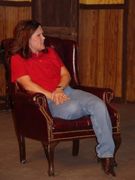In my last article I described the initiation of behavior cognitive therapy in treating my obsessive compulsive disorder associated with my hypochondria. I talked a little about my psychiatrist and how I found her personality to be a little overwhelming.
After the first real session where she described the therapy and how it can treat OCD, I thought long and hard about how well we would work together. Frankly, I was hoping that she would be more sympathetic. I wondered if her no nonsense attitude was part of the therapy. She was strict and determined to hold me accountable. I began to wonder if what I really wanted was a more sympathetic ear. I had envisioned therapy sessions where I would do most of the talking. Her style or method was clearly to grab the bull by the ears and deal with the very specific thoughts and processes of OCD.That proved difficult during our first sessions.
Dr. Romero said that the immediate cause of the hypochondria and the OCD was anxiety brought on by certain losses in my life over the last few years. The losses were things I could not control. They happened relatively close to each other, time wise. She said that to discover the real and profound underlying causes of that anxiety would take more time, and that we would get to it eventually, but for now she wanted to cure me of the OCD associated with the hypochondria. By the way Dr. Romero mentioned Sigmund Freud every so often, which I found very interesting. (He is fascinating, but there are theories of his I really disagree with.)
I did not want Dr. Romero’s personality to get in the way of the therapy, and for a while I thought it would. And then I realized that the dynamics of her personality were similar to mine. We were both smart, intense, articulate and a little stubborn. She could be very blunt and so could I. Maybe that was the problem. When I finally made the decision that I would continue seeing her, and that I would just have to get over the fact that we were similar in character, I relaxed and started appreciating the therapy. I liked how she was always attentive, although sometimes it was tiring, and the fact that she concentrated so much on the dynamics of OCD, although at first it made me uneasy like bad tasting medicine, but that you know will help in the end.





Add a Comment3 Comments
My therapist is no-nonsense in regards to my OCD, and extremely empathetic to my humanity and pain. At first this was really hard because I identified with my OCD so much, I assumed he was attacking me, when in fact he was intentionally going after the OCD. He had faith that there was more to me than my anxiety and rituals. Also, he encourages me to be honest with him--if he does something that pisses me off, he wants to know so we can work it through. This helps when he goes too fast--I can tell him that's what I am feeling, and he can tell me more about what his goals are, and I can clarify what is freaking me out.
April 2, 2010 - 9:14amThis Comment
Hi Rheyanne,
March 17, 2010 - 8:20amI think she believes that being forceful is the best way. But you know the next time I see her I will mention that at first I found her a bit overwhelming, and sometimes I still do. I like your idea of easing into things.
Frankly, there are sessions when I start feeling sorry for myself, and she sort of brings me back on task reminding me that we are here together working on my problem, and that I have made progress.At those times her no nonsense approach really works.
I appreciate your empathy.
Zelda
This Comment
Very interesting---I like when a psychologist actually tells me what to do and gives me tips and ways to deal with certain situations and helps me directly reach my goals. I am tired of always talking about myself during sessions, though I know that is a part of how the psychologist gets to know you. The first several sessions are almost reserved for that, so after that point it's nice to get down to what I'm there for. It is also nice to vent.
I haven't really encountered a psychiatrist who put in that same amount of effort (maybe one in the several I've gone to). Psychiatrists usually have a short session and try to throw pills at me before really knowing me (which is where talking usually comes in handy). I personally think there should be more sessions before pills are discussed. There is the possibility for a wrong diagnosis if the medication aspect enters too quickly, at least from my perspective. Regardless, I know it is also good to get on medication right away in some cases.
Have you talked to your psychiatrist about what you want out of the sessions and asked if she be a little less forceful for now? It's always nice to ease into everything. I think everyone's different in how they want to approach helping themselves, and a psychiatrist should want to work with you on that. She might also say she thinks being forceful is the best way, but you could talk to her about that.
March 16, 2010 - 5:15pmThis Comment